Latin America and the Caribbean have become “a hot spot” for the COVID-19 pandemic, with several countries now having one of the highest per capita infection rates and absolute number of cases in the world, U.N. Secretary-General Antonio Guterres said Thursday.
The U.N. chief said in a video and briefing report that a 9.1% contraction in GDP is expected this year in the region, which would be the “largest in a century.”
“COVID-19 represents a massive health, social and economic shock with an immense human toll for the countries of Latin America and the Caribbean,” the report said. “It is expected to result in the deepest recession in living memory.”
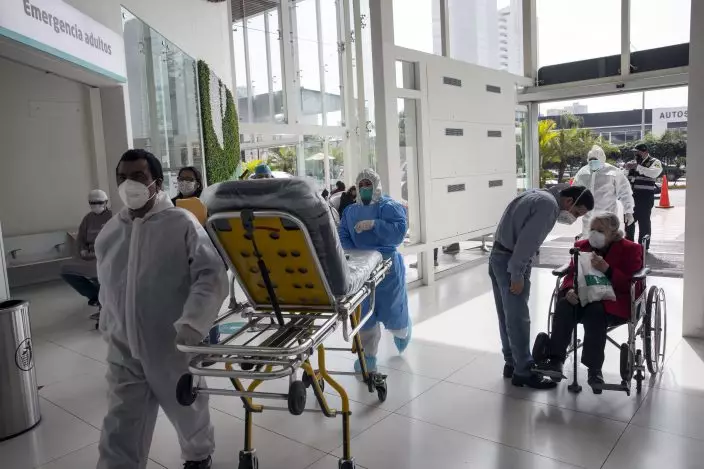
Nurses and patients gather at the emergency entrance of the private Ricardo Palma hospital amid the new coronavirus pandemic, in Lima, Peru, Tuesday, July 7, 2020. (AP PhotoRodrigo Abd)
According to the report, unemployment in the region is expected to rise to 13.5% from 8.1% last year, affecting more than 44 million people, compared to over 18 million in 2019. The poverty rate is expected to rise to 37.2% from 30.2%, meaning 230 million people will be affected compared to 185 million last year, it said.
Guterres said Latin America and the Caribbean already face “gaping inequalities,” high levels of informal labor and fragmented health services — and the region’s most vulnerable people “are once again being hit the hardest” by COVID-19.
“Women, who make up the majority of the workforce in economic sectors being most affected, now must also bear the brunt of additional care-giving,” Guterres said. “Older persons and persons with disabilities are at much higher risk of death from the virus. ”
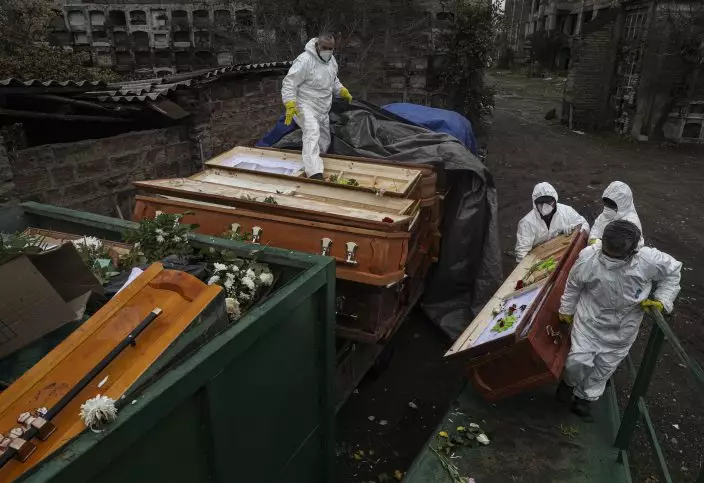
Workers collect and stack the coffins of people that have been recently cremated amid the new coronavirus pandemic at La Recoleta cemetery, in Santiago, Chile, Monday, July 6, 2020. The coffins are collected and destroyed by a company specializing in organic waste. (AP PhotoEsteban Felix)
He said Indigenous peoples, those of African descent, migrants and refugees “are also suffering disproportionately.”
“Urban transmission of COVID-19 is of special concern to Latin America and the Caribbean as the world’s most urbanized developing region,” the report said,.
Some 80% of the region’s population lives in cities, the U.N. chief said, pointing to slums especially in the largest ones as potential breeding grounds.
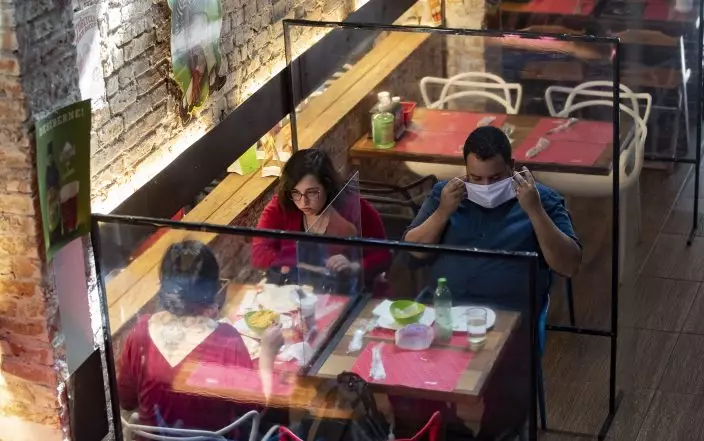
People eat lunch at a restaurant with plastic dividers between tables, as a preventative measure amid the COVID-19 pandemic in Sao Paulo, Brazil, Monday, July 6, 2020. Bars, restaurants and beauty salons were allowed to re-open Monday after over three months of quarantine, but are required to observe preventative measures and reduced operating hours only during the day. (AP PhotoAndre Penner)
With fragmented and unequal health systems, countries most affected by the pandemic — which Guterres didn't name — “are ill-prepared to handle a health and human crisis of this scale,” his report said.
“In a region which experienced a significant number of political crises and protests in 2019," Guterres warned that “increasing inequalities, exclusion and discrimination in the context of COVID-19 affect adversely the enjoyment of human rights and democratic developments, potentially even leading to civil unrest, if left unaddressed.”
He called on governments to do more to reduce poverty, food insecurity and malnutrition.
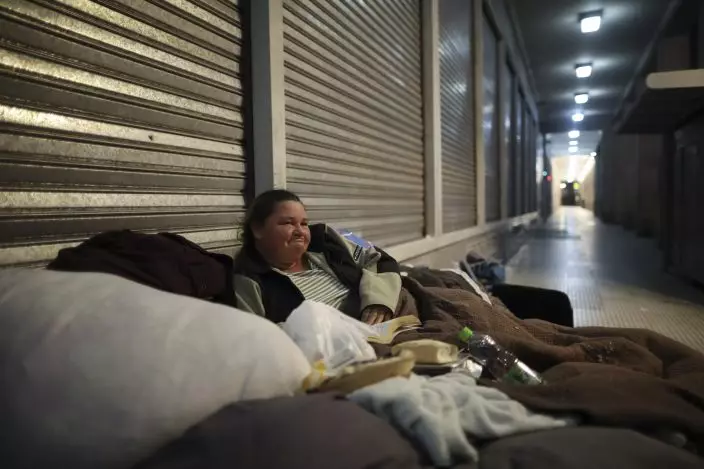
A homeless woman sits on a mattress on a sidewalk during a government-ordered lockdown to curb the spread of the new coronavirus in Buenos Aires, Argentina, Tuesday, July 7, 2020. (AP PhotoNatacha Pisarenko)
In the short-term, Guterres said, governments should consider providing people living in poverty with emergency basic incomes and anti-hunger grants. This could include the possibility of providing the equivalent income of the national poverty line, or about $140 per month for the region, the report said. The estimated cost for six months would amount to 1.9% of regional GDP, it said.
At the same time, Guterres said, greater international support is urgently needed. “For Latin America and the Caribbean, the international community must provide liquidity, financial assistance and debt relief,” he said.
The U.N. chief called for a post-pandemic transformation of Latin America and the Caribbean to reduce inequality that “has become untenable.”
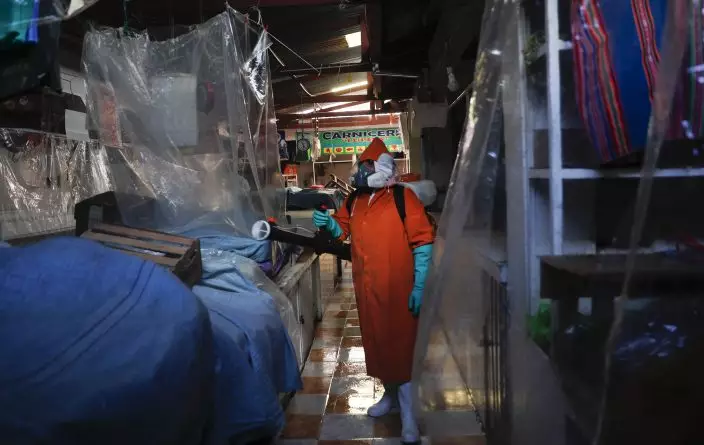
A city worker in full protective gear amid the new coronavirus pandemic disinfects the Haiti market in La Paz, Bolivia, Tuesday, June 23, 2020. Health authorities say that a butcher at the marker died several weeks ago of COVID related symptoms, prompting its closure. (AP PhotoJuan Karita)
“It means developing comprehensive welfare systems that are accessible to all,” Guterres said. “It means creating a fair taxation system, promoting decent jobs, strengthening environmental sustainability, and reinforcing social protection mechanisms.”
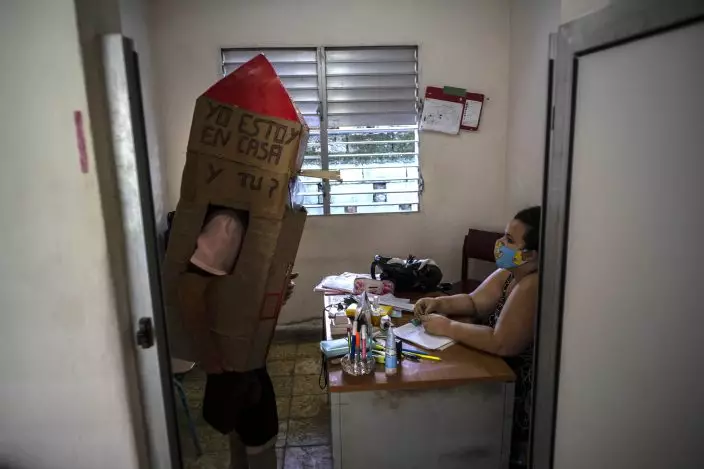
Retired nurse Feridia Rojas wearing a cardboard box as a protective measure against the spread of the new coronavirus, stops in for a friendly visit with the family doctor, in Havana, Cuba, Wednesday, July 8, 2020. The 82-year-old pensioner shuffles through the streets of Havana on shopping excursions wearing the cardboard box, with a handwritten message that reads in Spanish, "I'm home, and you?" (AP PhotoRamon Espinosa)


